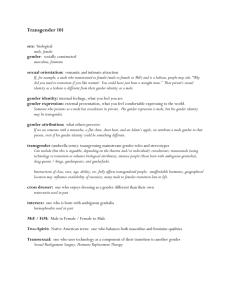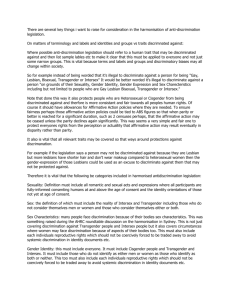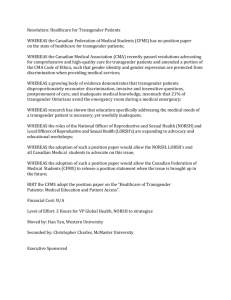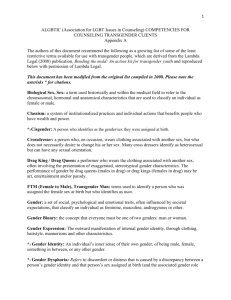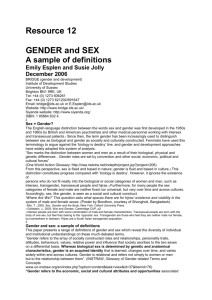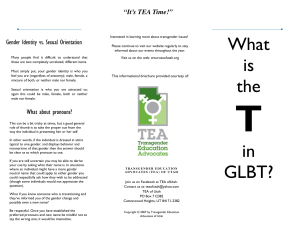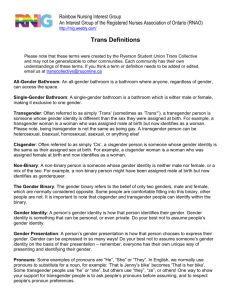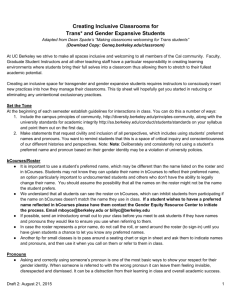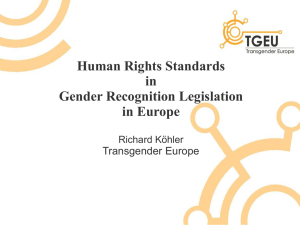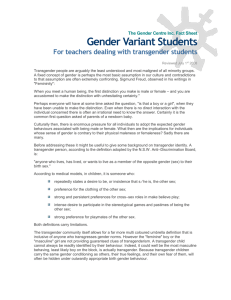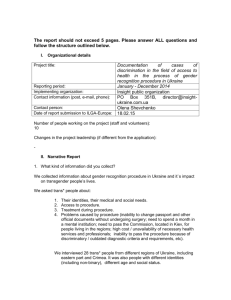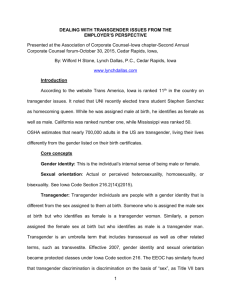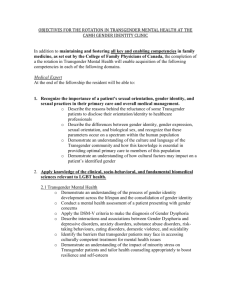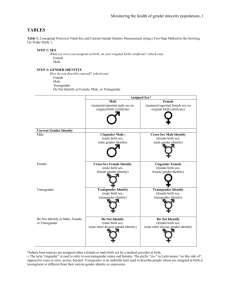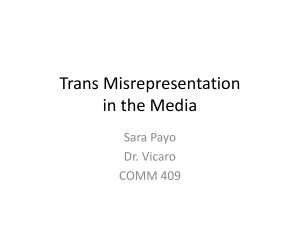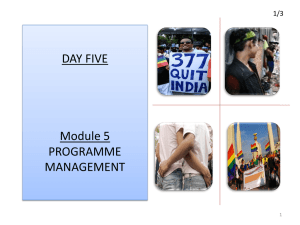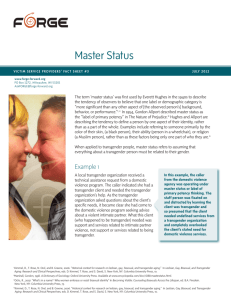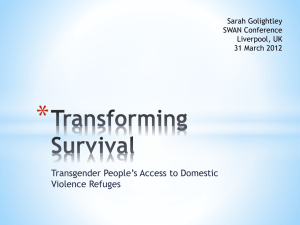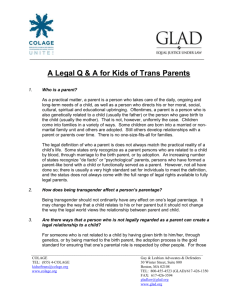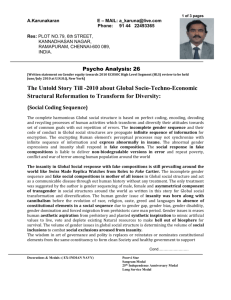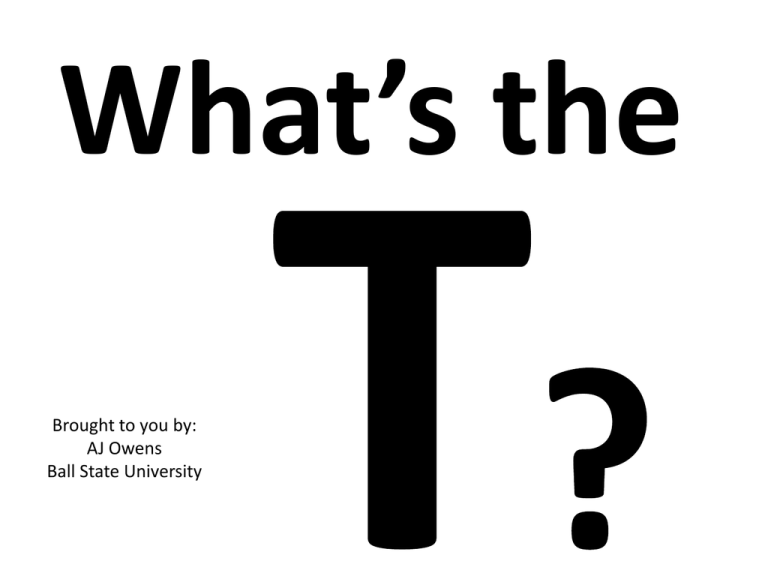
What’s the
Brought to you by:
AJ Owens
Ball State University
Transgender
• One of the less understood parts of the queer
alphabet, transgender refers to someone
whose biological sex is not in agreement with
their gender identity.
• Sex and gender are two words that often get
lumped together and viewed as the same
thing, but that is not always true.
Biological Sex
• Sex is purely physical. A person can be male,
female, or intersex.
– Intersex refers to someone who is not necessarily
transgender who has a chromosomal makeup that
is neither XX or XY. This is not the same thing as
being transgender.
• Sex is based on chromosomes, secondary sex
characteristics (breasts, body fat distribution,
etc.), and genitalia.
Gender
• Gender is a socially constructed idea about what a
person should behave like according to their
assigned gender at birth. Someone’s gender is
usually assigned based on their sex.
• People are socialized as male or female.
• Everything people attribute to what “boys do” and
what “girls do” is all determined by your
environment, culture, upbringing, and media.
There is very little biological influence if any at all.
Vocab Lesson!
• Transgender: A person whose biological sex is not in
agreement with their gender identity
• Cisgender: A person whose biological sex and gender identity
are in agreement. The majority of people are cisgender.
• Transexual: A person who undergoes physical treatments or
procedures to reflect their gender physically (breast
augmentation, hormone therapy, genital reconstruction, etc.)
• Gender Binary: The incorrect assumption that there are only
two genders. Gender is a continuum in which male and
female are on opposite ends. A person can fall on either end
or somewhere in between.
• Genderqueer: Someone who is transgender who does not
identify as either male or female.
Vocab Lesson!
• Intersex: A person whose chromosomes are neither XX
or XY. You may have heard this term as a
“hermaphrodite”, which is offensive.
• Gender Identity: Gender identity is something internal.
Every person has one whether it is male, female,
genderqueer, or something else altogether. Put simply,
gender identity is how you personally identify your own
gender.
• Gender Expression: Gender expression is the way that
you choose to show your gender to the world. People
do this by their mannerisms, the clothes they wear, the
words they use, and a million other things. Every
person expresses their gender a little differently.
Gender Binary
• Gender is not just male or female. Gender is like a
continuum. Think of it on a line where male is on
one end and female is on the other. A person can
identify their gender anywhere on that line. This is
both internal in the way you identify yourself and in
the way that you express your gender.
Male
Female
Why Should I Care?
Outside of just being a decent human being and basic respect for a person,
here are some nice statistics that illustrate why being a transgender ally are
important:
– Transgender people are four times more likely to live in poverty.
– Transgender people experience unemployment at twice the rate of the
general population, with rates for people of color up to four times the
national unemployment rate.
– 90% of transgender people report experiencing harassment,
mistreatment or discrimination on the job.
– 22% of respondents who have interacted with police reported
harassment by police, with much higher rates reported by people of
color. Almost half of the respondents (46%) reported being
uncomfortable seeking police assistance.
– 41% of respondents reported attempting suicide, compared to 1.6% of
the general population.
– Transgender people still cannot serve in the US Military.
Preferred Pronouns
• A pronoun is a way of referring to a person without
using a name (ex. He, she, they, we, I, you, etc.)
• A male typically prefers pronouns like he, himself,
and him.
• A female typically prefers she, herself, and her.
• Other common pronouns people may prefer are
– They, theirs, themself (used as singular)
– Ze, Zir, Zirself, Zes
• Ze = He, Zir = Him, Zirself = Himself, Zes = His
Misgendering
• It is important to use someone’s preferred gender
pronouns (PGPs) once you know what those
pronouns are.
• This is all about basic respect for how someone
wants to be referred to.
• If you identified as a male and someone always
called you she would you appreciate it? Probably
not.
How To Respectfully Ask
About PGPs
• The keyword here is to ASK. Do not assume!
• Be sure to always ask one on one if possible.
Do Say:
• Can you tell me what your preferred pronouns are?
• What pronouns do you prefer?
Don’t Say:
• What are you?
• Are you a boy or a girl?
Names
• Do not ask a person who is transgender what
their “old name” or “boy/girl name” is.
– This is really disrespectful, because it invalidates
the identity that they are displaying now.
– Also there is no legitimate reason that you need to
know in the first place. Being respectful is better
than curiosity.
• Whatever name someone tells you to call
them is what you should call them.
Words/Phrases Not To Use
• Tranny: Originated in the porn industry.
• Transvestite: Outdated term for a cross dresser.
• Cross Dresser: This is just a form of gender expression
that does not necessarily indicate someone is
transgender.
• Drag Queen/King: Drag is a performance of gender. It
has nothing to do with being transgender. This term is
not offensive, but it just does not substitute for
transgender.
• Hermaphrodite: A disrespectful way of saying intersex.
• It: People are not its. Simple as that.
• Have you had the surgery?: Do you want someone
asking about your genitals in casual conversation?
Laverne Cox
• Laverne Cox is a
trans* activist
and actress. She
is most famous
for her role as
Sophia on
Orange is the
New Black.

